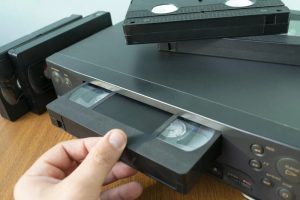 In the ever-evolving digital landscape, the fate of our cherished VHS tape collections has become a pressing concern for many. As the once-ubiquitous VHS players fade into obsolescence, the need to preserve our timeless home movies, family gatherings, and childhood memories has become increasingly vital. The question then arises: should we convert our VHS tapes to DVDs or opt for a digital file format? This decision carries significant implications for the longevity, accessibility, and quality of our video archives.
In the ever-evolving digital landscape, the fate of our cherished VHS tape collections has become a pressing concern for many. As the once-ubiquitous VHS players fade into obsolescence, the need to preserve our timeless home movies, family gatherings, and childhood memories has become increasingly vital. The question then arises: should we convert our VHS tapes to DVDs or opt for a digital file format? This decision carries significant implications for the longevity, accessibility, and quality of our video archives.
The Decline of VHS and the Rise of Digital Formats
The VHS tape, a staple of home entertainment for decades, has been steadily losing ground in the face of technological advancements. The sales of DVDs, once heralded as the successor to VHS, have also seen a dramatic decline, with a staggering 86% drop since 2008. This can be attributed to the proliferation of streaming platforms, which have revolutionized the way we consume media, rendering physical media formats increasingly obsolete.
As DVDs and DVD players become less common, the need to explore alternative options for preserving our VHS collections has become paramount. The digital age has ushered in a new era of storage and playback solutions, with flash drives and external hard drives emerging as viable alternatives to the aging VHS and DVD formats.
The Advantages of Digitizing VHS Tapes
Converting VHS tapes to a digital format offers several distinct advantages that make it a compelling choice for preserving your cherished memories.
Increased Durability and Longevity
VHS tapes are susceptible to a host of issues, including physical damage, mold, and water damage, which can lead to the irreversible loss of your video content. By transferring your VHS recordings to a digital file, you can safeguard your memories from these threats, ensuring their longevity for generations to come.
Enhanced Picture and Sound Quality
The transition from VHS to digital formats unlocks a world of improved visual and audio quality. While VHS tapes are limited by their inherent resolution constraints, digital conversions can capture your footage in high-definition, delivering a sharper, more vibrant viewing experience. This is particularly beneficial for older recordings, allowing you to revive and enjoy your memories with greater clarity.
Improved Accessibility and Portability
Digital files stored on flash drives or external hard drives offer unparalleled convenience and accessibility. You can easily share your converted videos with friends and family, watch them on a variety of devices, and even edit the footage using common video editing software. This versatility ensures that your memories remain readily available and easily enjoyed, no matter where life takes you.
Comparing VHS to DVD and Digital Conversions
When it comes to converting your VHS tapes, you have two primary options: DVD and digital file formats. Each option presents its own set of advantages and considerations.
VHS to DVD Conversion
Transferring your VHS tapes to DVDs offers several benefits:
-
- Enhanced Resolution: DVDs boast a significantly higher horizontal resolution compared to VHS, resulting in a noticeable improvement in image quality.
- Reduced Storage Space: DVDs are more compact than bulky VHS tapes, allowing you to store your converted videos in a more efficient manner.
- Widespread Accessibility: DVDs can be played on a variety of devices, including televisions and laptops, making them a convenient choice for many households.
However, the declining popularity of DVD players and the increasing prevalence of digital streaming platforms may limit the long-term viability of this format.
VHS to Digital Conversion
Opting for a digital file format, such as a high-definition MP4 or AVI, offers several distinct advantages:
-
- Compatibility and Versatility: Digital files can be easily shared, viewed, and even edited on a wide range of devices, including laptops, smartphones, and smart TVs, ensuring that your memories remain accessible.
- Increased Storage Capacity: With the ever-growing storage capacities of flash drives and external hard drives, you can digitize your entire VHS collection and store it in a compact, space-saving manner.
- Future-Proof Solution: As technology continues to evolve, digital file formats are more likely to maintain compatibility and remain accessible, ensuring that your converted videos can be enjoyed for years to come.
Factors to Consider When Choosing Between DVD and Digital Conversion
When deciding between converting your VHS tapes to DVDs or digital files, several factors should be taken into account:
Intended Use and Viewing Preferences
Consider how you plan to use and view your converted videos. If you primarily want to watch them on a television, a DVD conversion may be the more convenient option. However, if you envision sharing your videos across multiple devices or desire the flexibility to edit and manipulate the footage, a digital file format may be the better choice.
Storage and Accessibility
Evaluate your storage needs and the accessibility requirements for your converted videos. DVDs offer a more compact physical format, but digital files provide greater flexibility in terms of storage and ease of access across various devices.
Future-Proofing and Compatibility
As technology continues to evolve, it’s essential to consider the long-term compatibility and longevity of your chosen conversion format. Digital files are generally more future-proof, as they can be easily transferred to new storage media and are less susceptible to format obsolescence.
The Digitization Process: Ensuring Quality and Preservation
Regardless of your chosen conversion format, the digitization process itself is crucial in ensuring the quality and preservation of your VHS recordings. Entrusting your valuable memories to a reputable video conversion service can make all the difference in the final outcome.
Look for providers that utilize high-quality equipment and adhere to industry-standard practices, ensuring that your VHS tapes are handled with the utmost care and attention. The conversion process should be meticulous, with attention paid to color correction, noise reduction, and other image enhancement techniques to optimize the visual and audio quality of your converted videos.
Embracing the Digital Future: Preserving Your VHS Memories
As we navigate the transition from the analog era of VHS to the digital landscape, the preservation of our cherished video memories has become a pressing concern. By carefully weighing the advantages of DVD and digital file conversions, you can make an informed decision that best suits your needs and ensures the longevity of your VHS collection.
Whether you choose to convert your tapes to DVDs or opt for a digital file format, the ultimate goal is to safeguard your memories and embrace the opportunities that the digital age presents. By taking the necessary steps to preserve your VHS recordings, you can rest assured that your timeless
Contact Us (954-241-3188) To Learn More!
Tape Transfers | Audio Transfers | Film Transfers | Photo / Slide Scanning and Transfers
—
 About HB Media Solutions
About HB Media Solutions
Since 2007, we’ve been assisting South Florida families in preserving more than one million cherished memories through digitalization. We provide unbeatable value with the best pricing, top-notch video quality, and exceptional service. Our commitment to excellence includes superior quality, secure cloud storage, swift processing, convenient local dropoff, and a happiness guarantee.
 About HB Media Solutions
About HB Media Solutions



